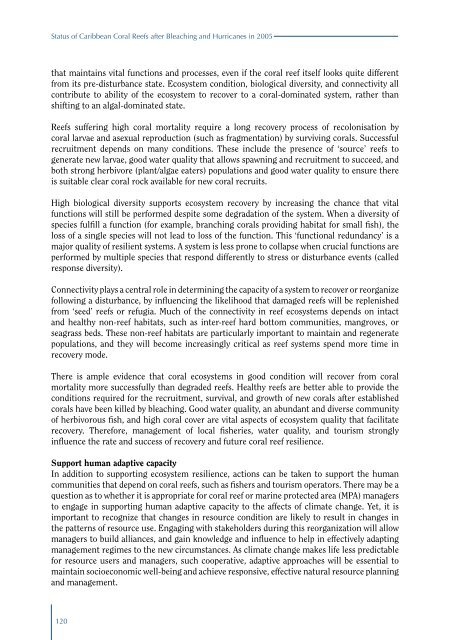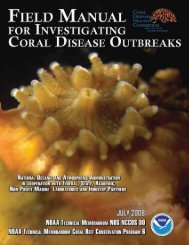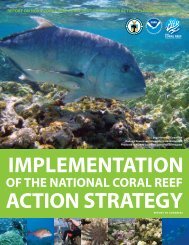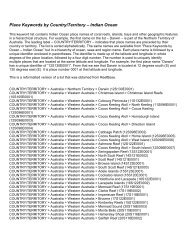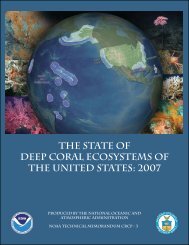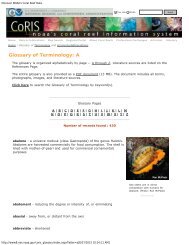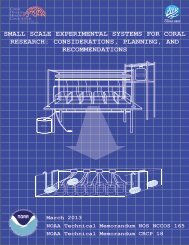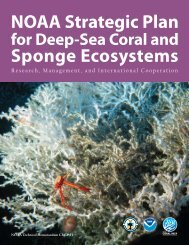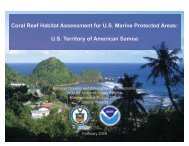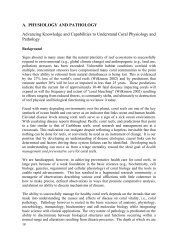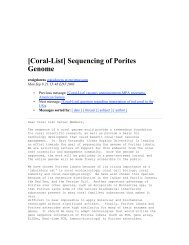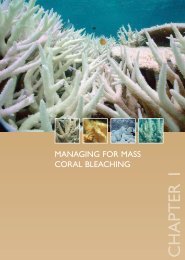Status of Caribbean coral reefs after bleaching and hurricanes in 2005
Status of Caribbean coral reefs after bleaching and hurricanes in 2005
Status of Caribbean coral reefs after bleaching and hurricanes in 2005
Create successful ePaper yourself
Turn your PDF publications into a flip-book with our unique Google optimized e-Paper software.
<strong>Status</strong> <strong>of</strong> <strong>Caribbean</strong> Coral Reefs <strong>after</strong> Bleach<strong>in</strong>g <strong>and</strong> Hurricanes <strong>in</strong> <strong>2005</strong>that ma<strong>in</strong>ta<strong>in</strong>s vital functions <strong>and</strong> processes, even if the <strong>coral</strong> reef itself looks quite differentfrom its pre-disturbance state. Ecosystem condition, biological diversity, <strong>and</strong> connectivity allcontribute to ability <strong>of</strong> the ecosystem to recover to a <strong>coral</strong>-dom<strong>in</strong>ated system, rather thanshift<strong>in</strong>g to an algal-dom<strong>in</strong>ated state.Reefs suffer<strong>in</strong>g high <strong>coral</strong> mortality require a long recovery process <strong>of</strong> recolonisation by<strong>coral</strong> larvae <strong>and</strong> asexual reproduction (such as fragmentation) by surviv<strong>in</strong>g <strong>coral</strong>s. Successfulrecruitment depends on many conditions. These <strong>in</strong>clude the presence <strong>of</strong> ‘source’ <strong>reefs</strong> togenerate new larvae, good water quality that allows spawn<strong>in</strong>g <strong>and</strong> recruitment to succeed, <strong>and</strong>both strong herbivore (plant/algae eaters) populations <strong>and</strong> good water quality to ensure thereis suitable clear <strong>coral</strong> rock available for new <strong>coral</strong> recruits.High biological diversity supports ecosystem recovery by <strong>in</strong>creas<strong>in</strong>g the chance that vitalfunctions will still be performed despite some degradation <strong>of</strong> the system. When a diversity <strong>of</strong>species fulfill a function (for example, branch<strong>in</strong>g <strong>coral</strong>s provid<strong>in</strong>g habitat for small fish), theloss <strong>of</strong> a s<strong>in</strong>gle species will not lead to loss <strong>of</strong> the function. This ‘functional redundancy’ is amajor quality <strong>of</strong> resilient systems. A system is less prone to collapse when crucial functions areperformed by multiple species that respond differently to stress or disturbance events (calledresponse diversity).Connectivity plays a central role <strong>in</strong> determ<strong>in</strong><strong>in</strong>g the capacity <strong>of</strong> a system to recover or reorganizefollow<strong>in</strong>g a disturbance, by <strong>in</strong>fluenc<strong>in</strong>g the likelihood that damaged <strong>reefs</strong> will be replenishedfrom ‘seed’ <strong>reefs</strong> or refugia. Much <strong>of</strong> the connectivity <strong>in</strong> reef ecosystems depends on <strong>in</strong>tact<strong>and</strong> healthy non-reef habitats, such as <strong>in</strong>ter-reef hard bottom communities, mangroves, orseagrass beds. These non-reef habitats are particularly important to ma<strong>in</strong>ta<strong>in</strong> <strong>and</strong> regeneratepopulations, <strong>and</strong> they will become <strong>in</strong>creas<strong>in</strong>gly critical as reef systems spend more time <strong>in</strong>recovery mode.There is ample evidence that <strong>coral</strong> ecosystems <strong>in</strong> good condition will recover from <strong>coral</strong>mortality more successfully than degraded <strong>reefs</strong>. Healthy <strong>reefs</strong> are better able to provide theconditions required for the recruitment, survival, <strong>and</strong> growth <strong>of</strong> new <strong>coral</strong>s <strong>after</strong> established<strong>coral</strong>s have been killed by <strong>bleach<strong>in</strong>g</strong>. Good water quality, an abundant <strong>and</strong> diverse community<strong>of</strong> herbivorous fish, <strong>and</strong> high <strong>coral</strong> cover are vital aspects <strong>of</strong> ecosystem quality that facilitaterecovery. Therefore, management <strong>of</strong> local fisheries, water quality, <strong>and</strong> tourism strongly<strong>in</strong>fluence the rate <strong>and</strong> success <strong>of</strong> recovery <strong>and</strong> future <strong>coral</strong> reef resilience.Support human adaptive capacityIn addition to support<strong>in</strong>g ecosystem resilience, actions can be taken to support the humancommunities that depend on <strong>coral</strong> <strong>reefs</strong>, such as fishers <strong>and</strong> tourism operators. There may be aquestion as to whether it is appropriate for <strong>coral</strong> reef or mar<strong>in</strong>e protected area (MPA) managersto engage <strong>in</strong> support<strong>in</strong>g human adaptive capacity to the affects <strong>of</strong> climate change. Yet, it isimportant to recognize that changes <strong>in</strong> resource condition are likely to result <strong>in</strong> changes <strong>in</strong>the patterns <strong>of</strong> resource use. Engag<strong>in</strong>g with stakeholders dur<strong>in</strong>g this reorganization will allowmanagers to build alliances, <strong>and</strong> ga<strong>in</strong> knowledge <strong>and</strong> <strong>in</strong>fluence to help <strong>in</strong> effectively adapt<strong>in</strong>gmanagement regimes to the new circumstances. As climate change makes life less predictablefor resource users <strong>and</strong> managers, such cooperative, adaptive approaches will be essential toma<strong>in</strong>ta<strong>in</strong> socioeconomic well-be<strong>in</strong>g <strong>and</strong> achieve responsive, effective natural resource plann<strong>in</strong>g<strong>and</strong> management.120


